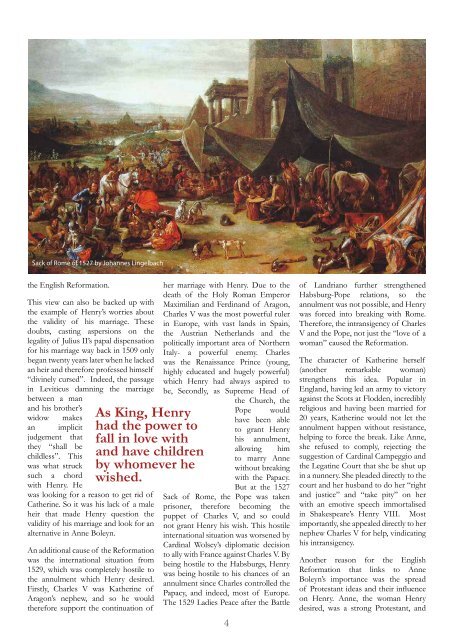Ink 2017
Ink is the School's academic magazine. Published annually, it is an outlet for both academic and creative writing, featuring contributions from Senior School students and members of staff.
Ink is the School's academic magazine. Published annually, it is an outlet for both academic and creative writing, featuring contributions from Senior School students and members of staff.
You also want an ePaper? Increase the reach of your titles
YUMPU automatically turns print PDFs into web optimized ePapers that Google loves.
Sack of Rome of 1527 by Johannes Lingelbach<br />
the English Reformation.<br />
This view can also be backed up with<br />
the example of Henry’s worries about<br />
the validity of his marriage. These<br />
doubts, casting aspersions on the<br />
legality of Julius II’s papal dispensation<br />
for his marriage way back in 1509 only<br />
began twenty years later when he lacked<br />
an heir and therefore professed himself<br />
“divinely cursed”. Indeed, the passage<br />
in Leviticus damning the marriage<br />
between a man<br />
and his brother’s<br />
widow makes<br />
an implicit<br />
judgement that<br />
they “shall be<br />
childless”. This<br />
was what struck<br />
such a chord<br />
with Henry. He<br />
As King, Henry<br />
had the power to<br />
fall in love with<br />
and have children<br />
by whomever he<br />
wished.<br />
was looking for a reason to get rid of<br />
Catherine. So it was his lack of a male<br />
heir that made Henry question the<br />
validity of his marriage and look for an<br />
alternative in Anne Boleyn.<br />
An additional cause of the Reformation<br />
was the international situation from<br />
1529, which was completely hostile to<br />
the annulment which Henry desired.<br />
Firstly, Charles V was Katherine of<br />
Aragon’s nephew, and so he would<br />
therefore support the continuation of<br />
her marriage with Henry. Due to the<br />
death of the Holy Roman Emperor<br />
Maximilian and Ferdinand of Aragon,<br />
Charles V was the most powerful ruler<br />
in Europe, with vast lands in Spain,<br />
the Austrian Netherlands and the<br />
politically important area of Northern<br />
Italy- a powerful enemy. Charles<br />
was the Renaissance Prince (young,<br />
highly educated and hugely powerful)<br />
which Henry had always aspired to<br />
be, Secondly, as Supreme Head of<br />
the Church, the<br />
Pope would<br />
have been able<br />
to grant Henry<br />
his annulment,<br />
allowing him<br />
to marry Anne<br />
without breaking<br />
with the Papacy.<br />
But at the 1527<br />
Sack of Rome, the Pope was taken<br />
prisoner, therefore becoming the<br />
puppet of Charles V, and so could<br />
not grant Henry his wish. This hostile<br />
international situation was worsened by<br />
Cardinal Wolsey’s diplomatic decision<br />
to ally with France against Charles V. By<br />
being hostile to the Habsburgs, Henry<br />
was being hostile to his chances of an<br />
annulment since Charles controlled the<br />
Papacy, and indeed, most of Europe.<br />
The 1529 Ladies Peace after the Battle<br />
4<br />
of Landriano further strengthened<br />
Habsburg-Pope relations, so the<br />
annulment was not possible, and Henry<br />
was forced into breaking with Rome.<br />
Therefore, the intransigency of Charles<br />
V and the Pope, not just the “love of a<br />
woman” caused the Reformation.<br />
The character of Katherine herself<br />
(another remarkable woman)<br />
strengthens this idea. Popular in<br />
England, having led an army to victory<br />
against the Scots at Flodden, incredibly<br />
religious and having been married for<br />
20 years, Katherine would not let the<br />
annulment happen without resistance,<br />
helping to force the break. Like Anne,<br />
she refused to comply, rejecting the<br />
suggestion of Cardinal Campeggio and<br />
the Legatine Court that she be shut up<br />
in a nunnery. She pleaded directly to the<br />
court and her husband to do her “right<br />
and justice” and “take pity” on her<br />
with an emotive speech immortalised<br />
in Shakespeare’s Henry VIII. Most<br />
importantly, she appealed directly to her<br />
nephew Charles V for help, vindicating<br />
his intransigency.<br />
Another reason for the English<br />
Reformation that links to Anne<br />
Boleyn’s importance was the spread<br />
of Protestant ideas and their influence<br />
on Henry. Anne, the woman Henry<br />
desired, was a strong Protestant, and







